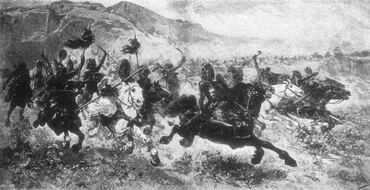7091. 'Thus said Jehovah, the God of Israel' means that it - the admonition to those opposed to the Church's truths - comes from the Lord's Divine Human. This is clear from the consideration that 'Jehovah, the God of Israel' is used to mean the Lord in respect of the Divine Human, for 'Jehovah' in the Word is the Lord, see 1343, 1736, 2921, 3023, 3075, 5041, 5663, 6281, 6303, 6905. He is called 'the God of Israel' because the Lord's spiritual kingdom is meant by 'Israel', 6426, 6637, and because by His Coming into the world the Lord saved those who belonged to that kingdom or Church, 6854, 6914, 7075. The reason why 'the God of Israel' means the Lord in respect of the Divine Human is that those who belong to that Church envisage everything spiritual or celestial, and the Divine too, in the way they envisage natural things. Therefore if they did not think in a natural way of the Divine as a Person they could not be joined to the Divine through any kind of affection. For if they did not think about the Divine as a Person in a natural way they would have either no ideas at all about the Divine, or else monstrous ones, and so would defile the Divine. So this is why 'the God of Israel' is used to mean the Lord in respect of the Divine Human, in particular of the Divine Natural.
'Israel' and 'Jacob' are used in the highest sense to mean the Lord's Divine Natural, 'Israel' the internal Divine Natural and 'Jacob' the external Divine Natural, see 4570.
Those who belong to the spiritual Church have been and are saved by means of the Lord's Divine Human, 2833, 2834.
The member of the spiritual Church, who is 'Israel', is interior natural, 4286, 4401.
[2] From all this it is now evident why in the Word the Lord is called 'Jehovah, the God of Israel' and 'Jehovah, the Holy One of Israel'. Anyone may see that when the Divine is referred to by these names it is solely because they are suitable for expressing something Holy that is not apparent in the sense of the letter. The fact that the Lord in respect of the Divine Natural is meant by 'the God of Israel' is evident from quite a number of places in the Word, plainly so from the following,
Moses and Aaron, Nadab and Abihu, and the seventy elders of Israel saw the God of Israel, under whose feet there was so to speak a paved work of sapphire stone, like the substance of the sky for clearness. Exodus 24:9-10.
[3] The fact that this was the Lord, and not Jehovah, who is called the Father, is evident from the Lord's words in John,
Nobody has ever seen God. John 1:18.
You have never heard His voice nor seen His shape. John 5:37.
In Isaiah,
I will give you the treasures of darkness, and the secret wealth of concealed places, that you may know that it is I, Jehovah, who called you by your name, the God of Israel. Isaiah 45:3.
In Ezekiel,
Over the heads of the cherubim, in appearance like a sapphire stone, there was the likeness of a throne, and over the likeness of a throne there was a likeness, as the appearance of a man (homo) upon it above. And with him there was the appearance of fire and a rainbow, and of brightness round about. Ezekiel 1:26-28.
These things are called the glory of Jehovah and of the God of Israel in the same prophet, in Ezekiel 1:28; 8:4; 9:3; 10:19-20, and also where the New Temple is the subject, in Ezekiel 43:2; 44:2, [4]. ['The God of Israel' appears] in many other places besides these, such as Isaiah 17:6; 21:10, 17; 24:15; 41:17; Psalms 41:13; 59:5; 68:8, 35; 69:6; 72:18; and elsewhere. The name THE HOLY ONE OF ISRAEL is also used in Isaiah 1:4; 5:19, 24; 10:20; 17:7; 30:11-12, 15; 49:7; 60:9, 14; Ezekiel 39:7.
[4] The fact that the Lord in respect of His Divine Human is meant by 'the God of Israel' and 'the Holy One of Israel' is also clear from His being called Redeemer, Saviour, and Maker: REDEEMER in Isaiah 47:4 (Jehovah Zebaoth is our Redeemer, the Holy One of Israel is His name), and also in Isaiah 41:14; 43:14; 48:17; 54:5; SAVIOUR in Isaiah 43:3 and MAKER in Isaiah 45:11. From this it is also evident that no one other than the Lord is meant in the Old Testament Word by Jehovah, since He is called JEHOVAH GOD and THE HOLY ONE OF ISRAEL, REDEEMER, SAVIOUR, and MAKER. He is called Jehovah the Redeemer and Saviour in Isaiah,
That all flesh may know that I Jehovah am your Saviour, and your Redeemer, the Mighty One of Jacob. Isaiah 49:26.
In the same prophet,
That you may know that I Jehovah am your Saviour, and your Redeemer, the Powerful One of Jacob. 1
Isaiah 60:16.
Also in Isaiah 43:14; 44:6, 24; 54:8; 63:16; Psalms 19:14.
[5] The fact that the Lord saved Israel, that is, those who belonged to the spiritual Church, may be seen in Isaiah,
I will tell of the mercies of Jehovah, the praises of Jehovah, according to all that Jehovah has rewarded us with - great [as He is] in goodness to the house of Israel. He said, Surely they are My people, children who do not lie. And therefore He became their Saviour. In all their affliction He suffered affliction, and the angel of His face delivered them; because of His love and His compassion He redeemed them, and took them and carried them all the days of eternity. Isaiah 63:7-9.
Poznámky pod čarou:







